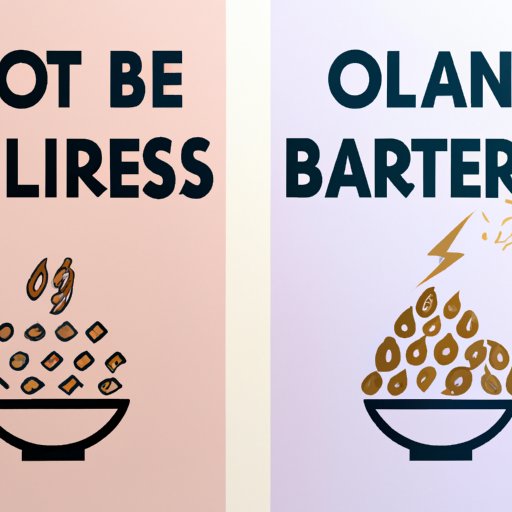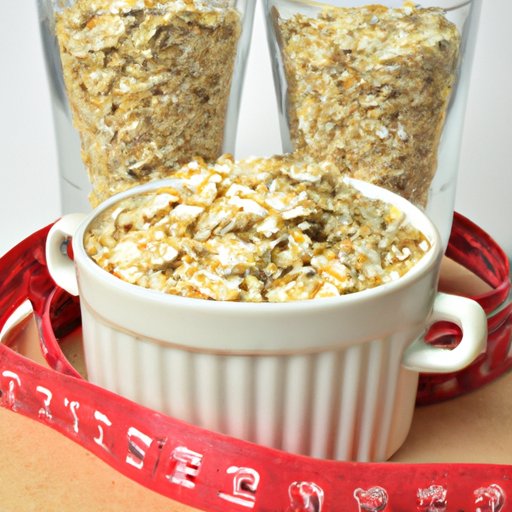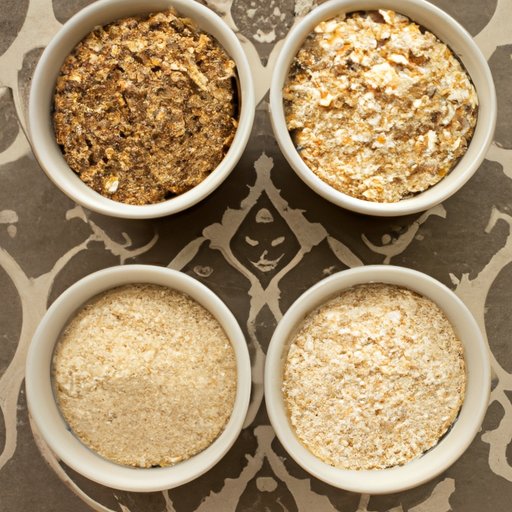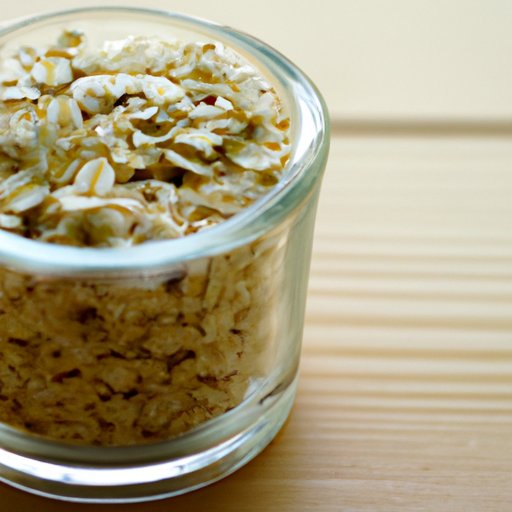Introduction
Oatmeal is a popular breakfast food that has been around for centuries. It is made from ground oat groats, which are whole grains with the hulls removed. Oatmeal is high in protein, fiber, antioxidants, and other essential vitamins and minerals. It is also low in fat and calories, making it an excellent choice for those looking to lose weight or simply maintain a healthy lifestyle.
Examining the Nutritional Benefits of Oatmeal
Oatmeal is packed with nutrients that can help support overall health. It contains a variety of vitamins and minerals, including vitamin B6, iron, magnesium, and zinc. It is also a good source of protein, providing 8 grams per one-cup serving. The fiber content of oatmeal is particularly impressive, with 4 grams of dietary fiber in each serving. This helps keep you feeling full longer and can help reduce cholesterol levels.
A meta-analysis published in the British Journal of Nutrition found that consuming oatmeal can improve heart health by reducing total cholesterol and LDL (“bad”) cholesterol levels. The study also found that oatmeal can lower blood pressure, which is linked to a reduced risk of stroke, heart attack, and other cardiovascular diseases.
How to Incorporate Oatmeal into a Healthy Diet
Making oatmeal part of your diet is easy and straightforward. Start by preparing your oatmeal using either water or milk. For extra flavor, you can add cinnamon, nutmeg, or other spices. When adding toppings, opt for healthier options like fresh fruit, nuts, seeds, or a drizzle of honey.
You can enjoy oatmeal for breakfast, but it can also be eaten at other meals. Add cooked oatmeal to smoothies, yogurt bowls, or overnight oats. You can also use it as a base for savory dishes like baked oatmeal casseroles or veggie-packed frittatas.

The Pros and Cons of Eating Oatmeal Every Day
Eating oatmeal on a regular basis can provide numerous health benefits. It is a good source of vitamins and minerals, and its high fiber content can help lower cholesterol levels and keep you feeling fuller for longer. Additionally, research has shown that eating oatmeal can reduce the risk of developing certain types of cancer.
However, there are some potential risks associated with eating oatmeal every day. People with celiac disease or gluten sensitivities should avoid oats due to their potential cross-contamination with wheat. Additionally, oatmeal contains phytic acid, which can interfere with the absorption of certain minerals and vitamins. For this reason, it is important to pair oatmeal with other nutrient-rich foods to ensure optimal absorption.

Exploring the Role of Oatmeal in Weight Loss
Oatmeal can play an important role in weight loss. Its high fiber content helps keep you feeling fuller for longer, while its low calorie count makes it an ideal choice for those trying to cut back on calories. Additionally, eating oatmeal can help reduce cravings and control blood sugar levels, which can help you stick to your weight loss plan.
When incorporating oatmeal into a weight loss plan, it is important to consider portion size and toppings. Stick to a one-cup serving size and choose healthy toppings, such as fresh fruit, nuts, and seeds. Avoid adding too much sugar, butter, or cream, as these can quickly add up in calories.

Comparing Different Types of Oatmeal and Their Health Benefits
Not all oatmeals are created equal. Here is a look at three of the most common types of oatmeal and their nutritional benefits:
Steel-Cut Oats
Steel-cut oats are made from groats that have been chopped into small pieces. They are higher in fiber than other types of oatmeal, and they take longer to cook. Steel-cut oats may help reduce cholesterol levels and may help regulate blood sugar levels.
Rolled Oats
Rolled oats are made from groats that have been steamed and flattened. They cook faster than steel-cut oats, making them a convenient option for busy mornings. They are also high in fiber and may help reduce cholesterol levels.
Instant Oatmeal
Instant oatmeal is made from pre-cooked oats that have been dried and packaged. It is typically flavored with sugar, salt, and other additives. While it is convenient, it is not as nutritious as steel-cut or rolled oats, so it should be consumed in moderation.
Conclusion
Oatmeal is a nutritious and versatile food that can be easily incorporated into a healthy diet. It is packed with vitamins and minerals, and its high fiber content can help reduce cholesterol levels and keep you feeling fuller for longer. However, it is important to be mindful of portion size and toppings when incorporating oatmeal into a weight loss plan. Additionally, different types of oatmeal offer varying nutritional benefits, so it is important to compare them before making a selection.
(Note: Is this article not meeting your expectations? Do you have knowledge or insights to share? Unlock new opportunities and expand your reach by joining our authors team. Click Registration to join us and share your expertise with our readers.)
